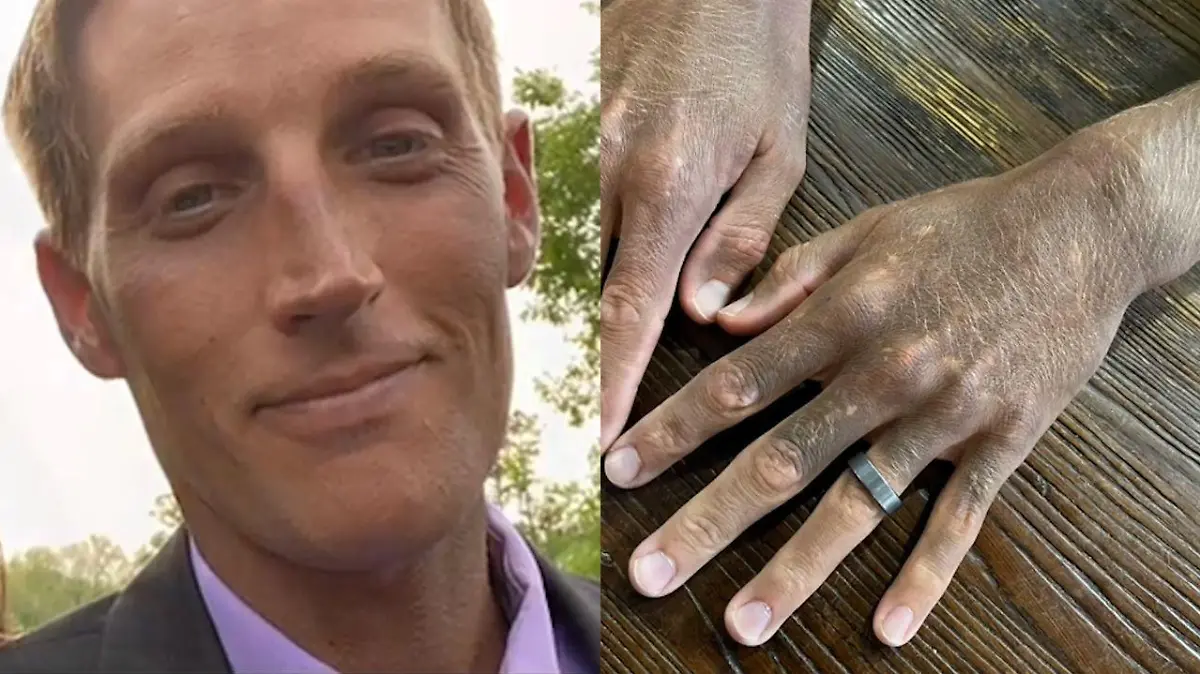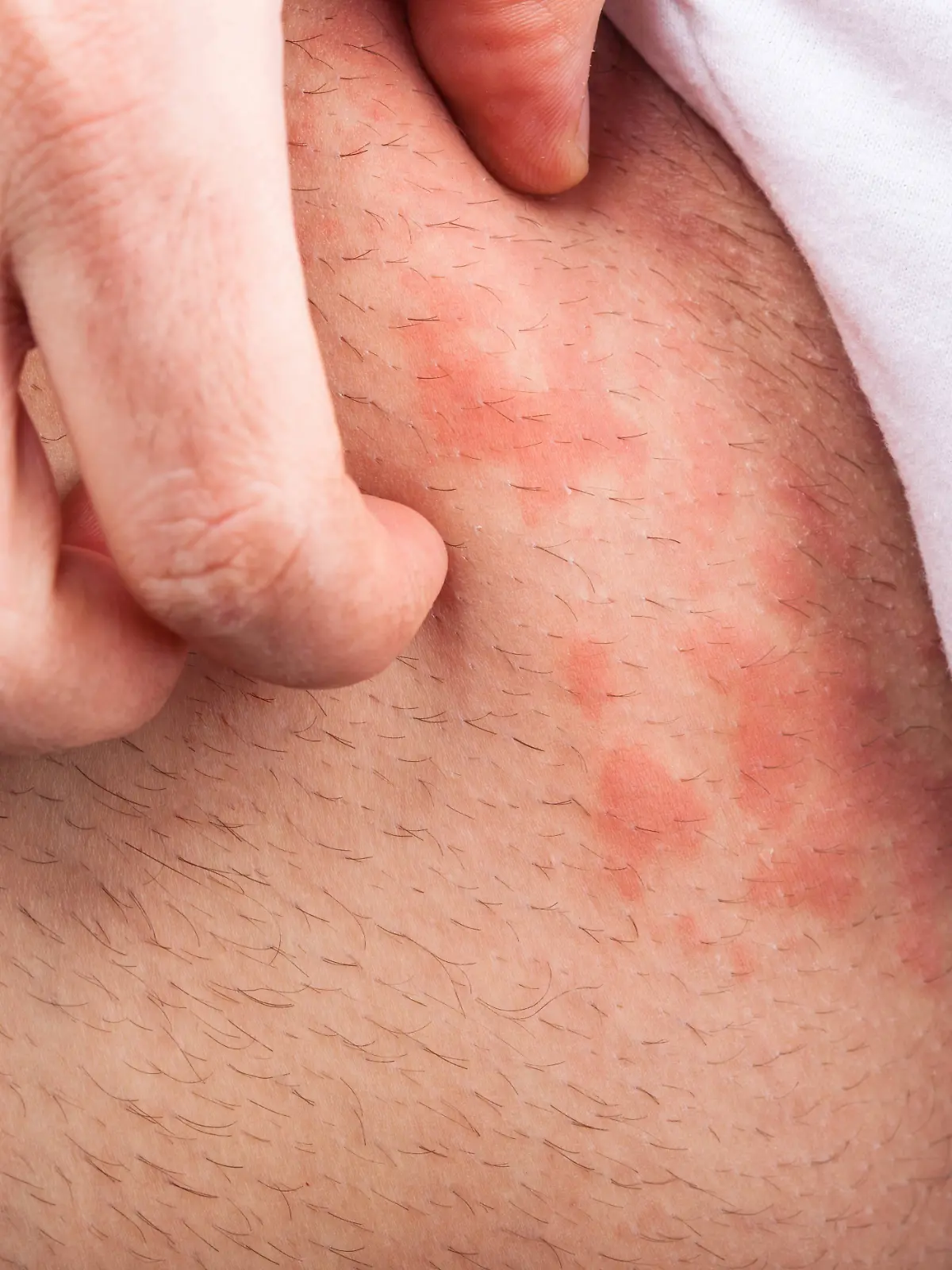Medizinisches RätselTyler (34) nimmt Antidepressivum - dann färbt sich seine Haut plötzlich grau

Weil Tyler Monk aus dem US-Staat Louisiana an Depressionen und Angstzuständen leidet, wird ihm im Januar 2021 ein Antidepressivum mit dem Wirkstoff Fluoxetin verschrieben. Einige Wochen nach Beginn der Einnahme bemerkt der 34-Jährige gravierende Veränderungen an seinem Körper: Die Haut an Gesicht, Händen, Armen und Hals verfärbt sich plötzlich dunkelgrau.
Lese-Tipp: Allergische Reaktion durch Akne-Medikament: Kirt (31) verliert Hautfarbe und Haare
"Sie sagten mir, ich sei ein medizinisches Rätsel"
„Als ich festgestellt habe, dass meine Haut dunkler wird, habe ich das Medikament sofort abgesetzt“, berichtet Tyler Monk auf TikTok. „Es passierte ziemlich schnell. Ich nahm das Medikament nur ein paar Wochen ein.“ Doch die grau-blaue Haut bleibt – auch jetzt noch, über ein Jahr nach dem Absetzen des Mittels.
Familienvater Tyler ist verzweifelt, sucht Antworten bei verschiedenen Ärzten. Doch die Tests auf mögliche Erkrankungen wie Morbus Addison oder Sklerodermie, die hinter der Hautverfärbung stecken könnten, fallen alle negativ aus. „Ich bin scheinbar innerlich gesund“, so der US-Amerikaner.
Betroffen seien nur die Hautstellen, die mit dem Sonnenlicht in Berührung kommen, erläutert seine Frau Emily, die den Fall ihres Ehemannes auf TikTok dokumentiert. Doch auch eine typische Fotosensibilität, eine erhöhte Empfindlichkeit der Haut gegen Licht, die unter anderem nach der Einnahme bestimmter Medikamente auftreten kann, schließen die Ärzte aus. Denn dabei verfärbe sich die Haut nicht blau-grau.
Auch eine Vergiftung mit Schwermetallen sei nach den Tests ausgeschlossen worden. „Keiner der Spezialisten, mit denen wir gesprochen haben, weiß, warum sein Körper so auf die Medizin reagiert hat“, erklärt Emily weiter. Zuletzt habe sein Hautarzt ihn an vier weitere Fachärzte verwiesen: „Sie sagten mir, ich sei ein medizinisches Rätsel“, erinnert sich Tyler.
Lese-Tipp: Wechselwirkungen drohen! Diese Medikamente sollten Sie niemals zusammen einnehmen
Warum ist Tylers Haut grau? Ursachenforschung geht weiter
Allgemeinarzt und Medizinjournalist Dr. Christoph Specht hält es für möglich, dass Tylers Hautverfärbung tatsächlich durch eine Überreaktion seines Körpers gegen das Antidepressivum entstanden sein könne. Fälle von starken Nebenwirkungen auf der Haut nach der Einnahme solcher Arzneien seien bekannt, wenn auch nur sehr vereinzelt, erklärt der Mediziner im Gespräch mit RTL.
Manchmal spiele dabei eine zusätzliche genetische Komponente eine Rolle. „Er kann zum Beispiel eine bestimmte genetische Ausstattung haben, die sonst nie eine Rolle spielt, und war dann einem bestimmten Stoff ausgesetzt, der allein auch nichts macht“, so Specht. Die Kombination aus beiden normalerweise harmlosen Faktoren könne dann eine solche Reaktion der Haut auslösen.
Neben dem Arzneimittel sei auch denkbar, dass ein Stoff, mit dem Tyler Monk bei seiner Arbeit als Schädlingsbekämpfer in Kontakt gekommen sei, die Reaktion ausgelöst habe. Aus der Ferne sei dies jedoch schwer zu beurteilen, gibt der Mediziner zu bedenken.
Ihr Mann wolle weiter auf Ursachenforschung gehen, berichtet Emily Monk in einem neuen TikTok-Video. Im November stehe der nächste Termin bei einem Spezialisten an. Die Familie hofft, dann vielleicht doch noch eine Antwort zu erhalten. (dhe/vdü)
Lese-Tipp: Sie sollte gegen Ekzeme helfen – Baby wird abhängig von Cortison-Salbe


